Syria air strikes: UK confident of successful mission, says PM 14 April 2018 Share this with Facebook Share this with Twitter Share this with Messenger Share this with Email Share Related TopicsSyria air strikes Media captionTheresa May said the UK had taken part in "limited and targeted strikes" The UK is "confident" that air strikes carried out by Britain, the US and France on suspected chemical weapons facilities in Syria have been successful, the PM has said. Theresa May also said it had been "right and legal" to take action. Military bases near the capital Damascus and the city of Homs were targeted, after an alleged chemical attack on the Syrian town of Douma. Labour's Jeremy Corbyn called the strikes "legally questionable". Syrian state media said there had been a "violation of international law". US and allies launch strikes on Syria Live updates: Western powers strike Syria targets Theresa May: Syria statement in full Nicola Sturgeon: Air strikes risk dangerous escalation Syria 'chemical attack': What we know Speaking in Downing Street, Mrs May said the "limited and targeted strikes" had degraded Syria's ability to use chemical weapons. "This collective action sends a clear message that the international community will not stand by and tolerate the use of chemical weapons," she said. Drawing a link with the recent nerve agent attack in Salisbury, Mrs May added: "We cannot allow the use of chemical weapons to become normalised - either within Syria, on the streets of the UK or elsewhere." She also said she would make a statement to Parliament on Monday and give MPs a chance to ask questions. The Ministry of Defence (MoD) said Storm Shadow missiles had been launched by four RAF Tornados at a former missile base 15 miles west of Homs, where it is thought President Bashar al-Assad's regime has been stockpiling items used to make chemical weapons. Media captionRAF planes took off from their airbase in Cyprus ahead of the strikes in Syria An MoD spokesperson added the facility was "located some distance from any known concentrations of civilian habitation", and scientific analysis was used to "minimise any risks of contamination to the surrounding area". A Nato meeting will be held on Saturday during which the UK, France and the US will brief allies on the action taken in Syria. Analysis By Frank Gardner, BBC security correspondent Whitehall officials say the aim of launching strikes against Syria has been to deal a big enough blow to the Assad regime that it deters it from using chemical weapons again - but not so big as to alter the course of the Syrian conflict or draw retaliation from Russia. Planners took the view that the limited US missile strike on Shayrat airbase a year ago had failed to dissuade the Assad regime from using poison gas. Before the green light was given by the prime minister for RAF participation in today's attack, the defence secretary spent time with the attorney general going over the legality of the targeting in precise detail. I am told that the lessons of the Chilcot Report - into the mistakes made over the Iraq invasion of 2003 - have been uppermost in people's minds. Decisions, phone calls and sign-offs made over the last few days may one day have to be scrutinised by lawyers. Russia too has been a major factor in choosing which targets to attack. Planners believe that the best way to mitigate against any Russian retaliation was to warn them in advance and avoid hitting any Russian positions in Syria. Addressing a press conference on Saturday, Mrs May said she believed the strike action had been "the right thing to do" and was "absolutely in Britain's national interest". "This is not about intervening in a civil war. It is not about regime change," she said. "It is about a limited and targeted strike that does not further escalate tensions in the region and that does everything possible to prevent civilian casualties." She said the UK government "judged it highly likely" that Syria had been using chemical weapons, and it was "clear" the Assad regime was responsible for the "despicable and barbaric" attack on civilians earlier in April. Evidence suggested a barrel bomb transported by a regime helicopter had been used to deliver the chemicals, she added. "No other group could have carried out this attack." Defence Secretary Gavin Williamson said Britain, the US and France had played an important role in "degrading the ability of the Syrian regime to use chemical weapons". Foreign Secretary Boris Johnson welcomed the news, saying the "world is united in its disgust for any use of chemical weapons, but especially against civilians". Media captionSyria strikes 'degraded' Assad's chemical weapons ability 'Chemical weapon stockpile' Reporting from RAF Akrotiri in Cyprus, the BBC's Jonathan Beale said the Tornados had left the airbase in the early hours of Saturday. He added the cruise missiles had been fired "well away from Syrian airspace" and were out of the range of the regime's air defences. It was assessed that the Syrian regime had been using the former missiles base to "keep chemical weapon precursors, stockpiled in breach of Syria's obligations under the Chemical Weapons Convention," the MoD said in a statement. Image copyrightPA PM has chosen which way to jump on Syria By Laura Kuenssberg, BBC political editor Prime ministers don't choose the decisions that face them. But they have to judge which way to jump. In 2013, Theresa May's predecessor tried and failed to get approval for military action against President Assad. There was international alarm, then as now, about his suspected use of chemical weapons. Read the full blog here. Meanwhile, the US Russian embassy Twitter account called the strikes "unacceptable and inadmissable". And Syria's official Sana news agency cited an unnamed source as saying: "When terrorists failed, the US, France and Britain intervened and committed aggression against Syria. "The American, French and British aggression against Syria will fail." In the UK, Mr Corbyn condemned the government's involvement in the air strikes, saying it "makes real accountability for war crimes and use of chemical weapons less, not more likely". He added that Mrs May should have sought parliamentary approval. Scotland's First Minister Nicola Sturgeon said Mrs May had not answered how the action, "taken without parliamentary approval, will halt their [Syria's] use" of chemical weapons, "or bring long term peace". Liberal Democrat leader Sir Vince Cable also said MPs should have had a vote on the action, adding: "Riding the coat-tails of an erratic US president is no substitute for a mandate from the House of Commons." But Northern Ireland's Democratic Unionist Party said Mrs May had "the full authority" to order the air strikes and it rejected "any suggestion that she was not entitled to do so". What is an RAF Tornado? Image copyrightGETTY IMAGES Tornado GR4 Crew: 2 Max speed: Mach 1.3 Weapons: Storm Shadow, Brimstone, ALARM, AIM-9 Sidewinder, Paveway II, Paveway III, Enhanced Paveway, General Purpose Bombs, Mauser 27mm cannon Source: RAF The Tornado has been one of the mainstays of the RAF since first entering service in 1980 and the aircraft were used to enforce no-fly zones in Iraq. It is mainly used as a strike or attack aircraft. Weapons such as the Storm Shadow cruise missile mean that the Tornado can hit targets from a significant distance. The MoD describes the missile as being designed for "long range, highly accurate, deep penetration" against enemy command and control bunkers. It is fired from a Tornado GR4. Tornado GR4s are also equipped with Brimstone missiles, an effective anti-armour weapon and can also be used for all-weather, day and night tactical reconnaissance. Related Topics SyriaUnited KingdomSyria air strikes Share this story About sharing Email Facebook Messenger Twitter Pinterest LinkedIn More on this story Syria air strikes: US and allies attack 'chemical weapons sites' 14 April 2018 Video May: 'We are acting together with our allies' 14 April 2018 Nicola Sturgeon: Air strikes risk dangerous escalation 14 April 2018 Syria: What can Western military intervention achieve? 12 April 2018 LIVE Western powers strike Syria targets after suspected chemical attack 14 April 2018 UK Rugby players Jackson and Olding sacked 14 April 2018 From the section Northern Ireland Full article Rugby players Jackson and Olding sacked SPORT Three female jockeys seek history 14 April 2018 From the section Horse Racing Full article Three female jockeys seek history Edinburgh march for vote on Brexit deal 14 April 2018 From the section Scotland Full article Edinburgh march for vote on Brexit deal More Videos from the BBC Shooting down US missiles is 'war' Trump: Strikes to deter chemical weapons Police officer ingests drugs during arrest 'IS killed our kids. Now I'm saving theirs' US-led airstrikes hit Syria 'I put pieces of plastic on my head' Recommended by Outbrain Elsewhere on BBC BBC News Smart cameras catch man in 60,000 crowd BBC Culture Cultural Calendar BBC News Nazi legacy found in Norwegian trees Recommended by Outbrain You Might Also Like BBC Travel Vada Pav: The ‘Indian burger’ McDonald’s can’t master BBC Travel Mamihlapinatapai: A lost language's untranslatable legacy BBC Travel Five countries primed for start-up success
Theresa May said the UK had taken part in "limited and targeted strikes"
The UK is "confident" that air strikes carried out by Britain, the US and France on suspected chemical weapons facilities in Syria have been successful, the PM has said.
Theresa May also said it had been "right and legal" to take action.
Military bases near the capital Damascus and the city of Homs were targeted, after an alleged chemical attack on the Syrian town of Douma.
Labour's Jeremy Corbyn called the strikes "legally questionable".
Syrian state media said there had been a "violation of international law".
- US and allies launch strikes on Syria
- Live updates: Western powers strike Syria targets
- Theresa May: Syria statement in full
- Nicola Sturgeon: Air strikes risk dangerous escalation
- Syria 'chemical attack': What we know
Speaking in Downing Street, Mrs May said the "limited and targeted strikes" had degraded Syria's ability to use chemical weapons.
"This collective action sends a clear message that the international community will not stand by and tolerate the use of chemical weapons," she said.
Drawing a link with the recent nerve agent attack in Salisbury, Mrs May added: "We cannot allow the use of chemical weapons to become normalised - either within Syria, on the streets of the UK or elsewhere."
She also said she would make a statement to Parliament on Monday and give MPs a chance to ask questions.
The Ministry of Defence (MoD) said Storm Shadow missiles had been launched by four RAF Tornados at a former missile base 15 miles west of Homs, where it is thought President Bashar al-Assad's regime has been stockpiling items used to make chemical weapons.
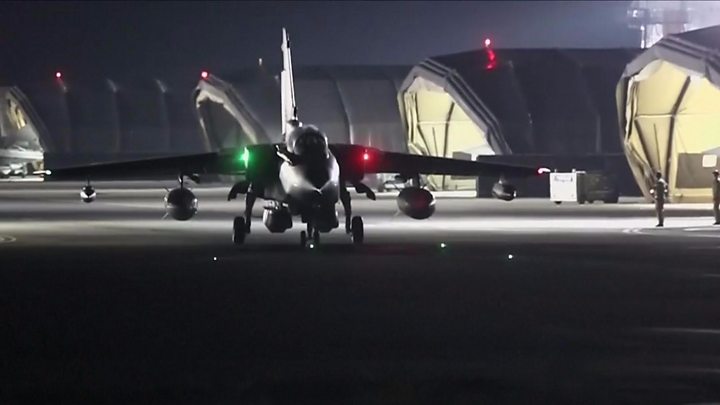
RAF planes took off from their airbase in Cyprus ahead of the strikes in Syria
An MoD spokesperson added the facility was "located some distance from any known concentrations of civilian habitation", and scientific analysis was used to "minimise any risks of contamination to the surrounding area".
A Nato meeting will be held on Saturday during which the UK, France and the US will brief allies on the action taken in Syria.

Analysis
By Frank Gardner, BBC security correspondent
Whitehall officials say the aim of launching strikes against Syria has been to deal a big enough blow to the Assad regime that it deters it from using chemical weapons again - but not so big as to alter the course of the Syrian conflict or draw retaliation from Russia.
Planners took the view that the limited US missile strike on Shayrat airbase a year ago had failed to dissuade the Assad regime from using poison gas.
Before the green light was given by the prime minister for RAF participation in today's attack, the defence secretary spent time with the attorney general going over the legality of the targeting in precise detail.
I am told that the lessons of the Chilcot Report - into the mistakes made over the Iraq invasion of 2003 - have been uppermost in people's minds. Decisions, phone calls and sign-offs made over the last few days may one day have to be scrutinised by lawyers.
Russia too has been a major factor in choosing which targets to attack. Planners believe that the best way to mitigate against any Russian retaliation was to warn them in advance and avoid hitting any Russian positions in Syria.

Addressing a press conference on Saturday, Mrs May said she believed the strike action had been "the right thing to do" and was "absolutely in Britain's national interest".
"This is not about intervening in a civil war. It is not about regime change," she said.
"It is about a limited and targeted strike that does not further escalate tensions in the region and that does everything possible to prevent civilian casualties."
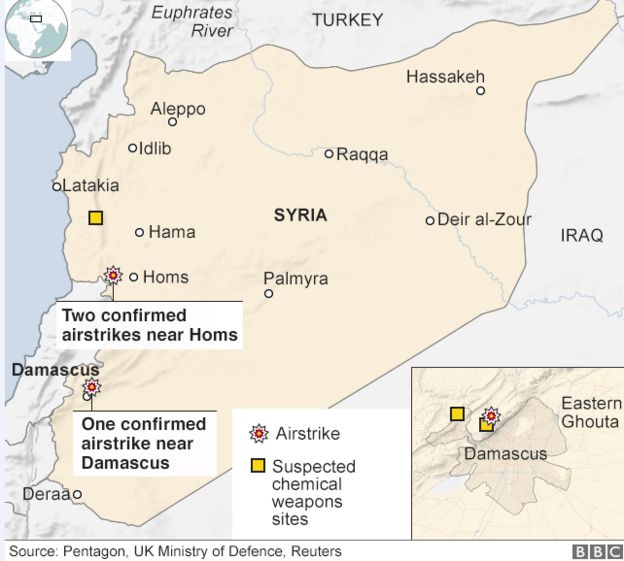
She said the UK government "judged it highly likely" that Syria had been using chemical weapons, and it was "clear" the Assad regime was responsible for the "despicable and barbaric" attack on civilians earlier in April.
Evidence suggested a barrel bomb transported by a regime helicopter had been used to deliver the chemicals, she added. "No other group could have carried out this attack."
Defence Secretary Gavin Williamson said Britain, the US and France had played an important role in "degrading the ability of the Syrian regime to use chemical weapons".
Foreign Secretary Boris Johnson welcomed the news, saying the "world is united in its disgust for any use of chemical weapons, but especially against civilians".
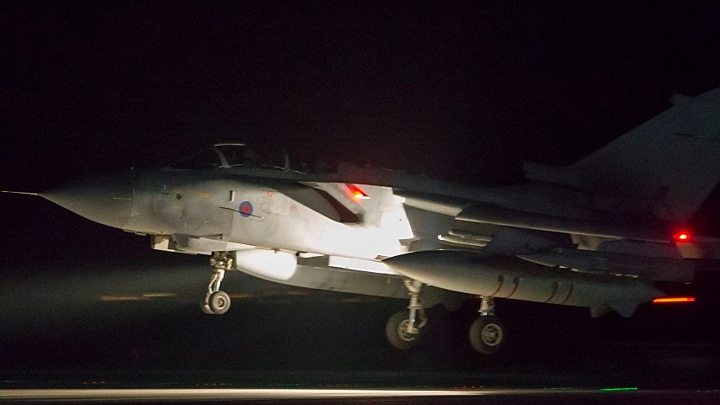
Syria strikes 'degraded' Assad's chemical weapons ability
'Chemical weapon stockpile'
Reporting from RAF Akrotiri in Cyprus, the BBC's Jonathan Beale said the Tornados had left the airbase in the early hours of Saturday.
He added the cruise missiles had been fired "well away from Syrian airspace" and were out of the range of the regime's air defences.
It was assessed that the Syrian regime had been using the former missiles base to "keep chemical weapon precursors, stockpiled in breach of Syria's obligations under the Chemical Weapons Convention," the MoD said in a statement.

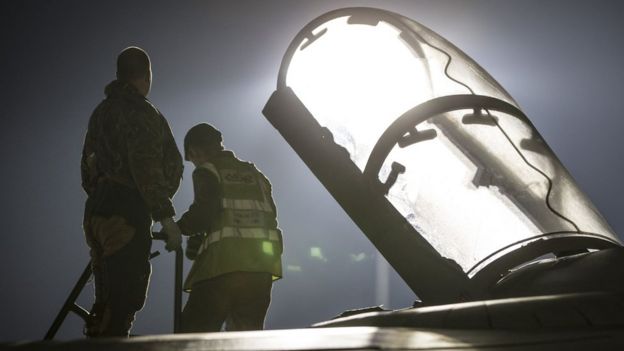 PA
PAPM has chosen which way to jump on Syria
By Laura Kuenssberg, BBC political editor
Prime ministers don't choose the decisions that face them. But they have to judge which way to jump.
In 2013, Theresa May's predecessor tried and failed to get approval for military action against President Assad. There was international alarm, then as now, about his suspected use of chemical weapons.

Meanwhile, the US Russian embassy Twitter account called the strikes "unacceptable and inadmissable".
And Syria's official Sana news agency cited an unnamed source as saying: "When terrorists failed, the US, France and Britain intervened and committed aggression against Syria.
"The American, French and British aggression against Syria will fail."
In the UK, Mr Corbyn condemned the government's involvement in the air strikes, saying it "makes real accountability for war crimes and use of chemical weapons less, not more likely".
He added that Mrs May should have sought parliamentary approval.
Scotland's First Minister Nicola Sturgeon said Mrs May had not answered how the action, "taken without parliamentary approval, will halt their [Syria's] use" of chemical weapons, "or bring long term peace".
Liberal Democrat leader Sir Vince Cable also said MPs should have had a vote on the action, adding: "Riding the coat-tails of an erratic US president is no substitute for a mandate from the House of Commons."
But Northern Ireland's Democratic Unionist Party said Mrs May had "the full authority" to order the air strikes and it rejected "any suggestion that she was not entitled to do so".

What is an RAF Tornado?
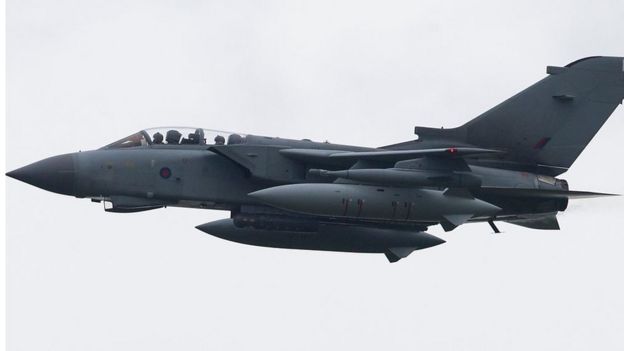 GETTY IMAGES
GETTY IMAGES
The Tornado has been one of the mainstays of the RAF since first entering service in 1980 and the aircraft were used to enforce no-fly zones in Iraq.
It is mainly used as a strike or attack aircraft.
Weapons such as the Storm Shadow cruise missile mean that the Tornado can hit targets from a significant distance. The MoD describes the missile as being designed for "long range, highly accurate, deep penetration" against enemy command and control bunkers. It is fired from a Tornado GR4.
Tornado GR4s are also equipped with Brimstone missiles, an effective anti-armour weapon and can also be used for all-weather, day and night tactical reconnaissance.



![HUU NDIO WADHIFU WA PROFESA MUSA ASSAD [CAG]MKAGUZI WA HESABU ZA SERIKALI NI TISHIO](https://blogger.googleusercontent.com/img/b/R29vZ2xl/AVvXsEj1OEVhvRaxD3NDD2tsZFLkz2i0004IalsX_A-xsaSL22dD41Bu-RgDF77NWedrHYiKjR4axImwxHuBCSZ0pVuZ9qlkgYmPh0j9jJq3ThLSS93GbHyS5pQXtNo6i8Gia5ezUgnV5lHpmdLP/s72-c/download+%25281%2529.jpg)

![HUU NDIO WADHIFU WA PROFESA MUSA ASSAD [CAG]MKAGUZI WA HESABU ZA SERIKALI NI TISHIO](https://blogger.googleusercontent.com/img/b/R29vZ2xl/AVvXsEj1OEVhvRaxD3NDD2tsZFLkz2i0004IalsX_A-xsaSL22dD41Bu-RgDF77NWedrHYiKjR4axImwxHuBCSZ0pVuZ9qlkgYmPh0j9jJq3ThLSS93GbHyS5pQXtNo6i8Gia5ezUgnV5lHpmdLP/w72-h72-p-k-no-nu/download+%25281%2529.jpg)
No comments
Post a Comment